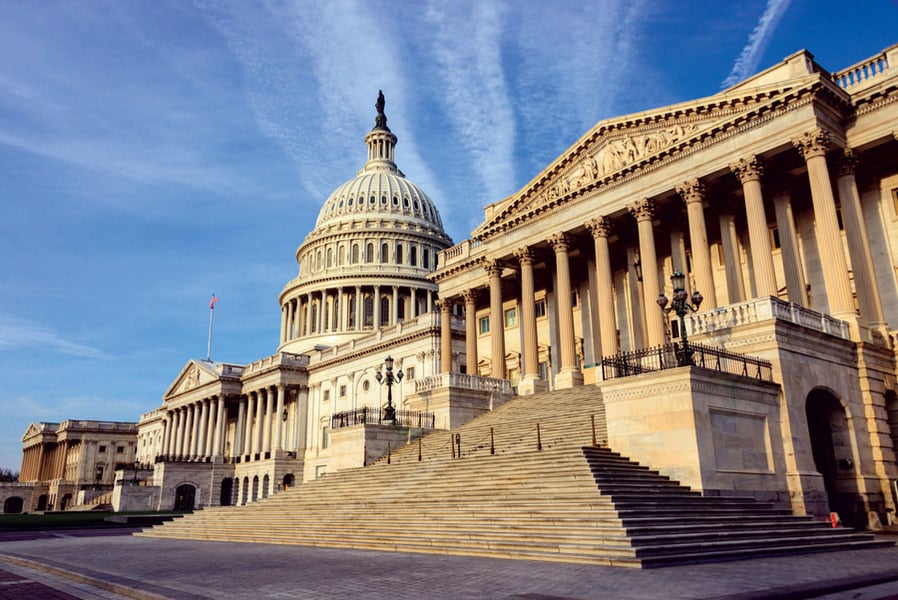

House Republicans want to bring the full Securities and Exchange Commission to Capitol Hill to question the agency about what the GOP sees as an agenda that is too big and aggressive — a move that foreshadows pressure the party likely will put on the agency if it wins the House in November.
The top Republicans on the House Financial Services Committee — Reps. Patrick McHenry, R-N.C. and ranking member; and Bill Huizenga, R-Mich. — on Friday urged the panel’s chair, Rep. Maxine Waters, D-Calif., to schedule a hearing featuring SEC Chairman Gary Gensler and the other commissioners.
The GOP legislators are renewing a call they first made in October for the full commission to appear before Congress. That request came after shortly after Gensler testified solo before the committee.
Since then, the lawmakers said, the SEC has “has taken several actions outside the scope of its authority and jurisdiction.’ The SEC’s push to establish a climate-risk disclosure mandate and other actions have drawn strong Republican opposition.
“It is imperative that our full Committee convene to discuss the SEC’s unprecedented rulemaking agenda and hear the full range of views on the Commission,” McHenry and Huizenga wrote in the letter to Waters.
McHenry and Huizenga criticized the SEC’s expansive list of regulatory priorities.
“The SEC has embarked on a scorched earth rulemaking agenda that includes 54 separate items for fall 2021 alone,” McHenry and Huizenga wrote.
They also took Gensler to task for not allowing long enough comment periods on rulemaking proposals, citing that as another reason for a hearing with the full commission.
A spokesperson for Waters did not immediately respond to a request for comment.
If the GOP doesn’t get its wish for a full-SEC hearing under Waters, they can call one next year if the party takes over the House following November’s election. In that scenario, McHenry likely would be the committee’s new chair and Huizenga also would have a high-ranking position.
It’s not unusual for a new party in power in the House to bring the full commission up to Capitol Hill if the commission has a majority that’s different from the one that controls the House, said Mike Canning, principal at The LXR Group. Democrats did so in 2007 and 2019.
“I have every reason to believe if Republicans win the House, we would see a hearing with all the commissioners sometime in 2023,” Canning said.
The normally five-person SEC currently consists of Gensler and three other members — Allison Herren Lee, Caroline Crenshaw and Hester Peirce. Gensler, Lee and Crenshaw form the Democratic majority. Peirce is a Republican. There is one GOP open seat on the commission.
If Republicans win the House and Senate, the party could exert more than rhetorical pressure on Gensler. They would be in a position to insert provisions in spending bills, known as riders, that would prohibit the SEC from pursuing certain regulatory actions.
“If both houses flip, it’s potentially a significant challenge for Gensler and the SEC,” Canning said.
Republicans not only want to stop many of Gensler’s priorities, they also want to promote their own. McHenry and Huizenga said in their letter that the SEC has not included on its agenda proposals to catalyze capital formation.
A hearing with the full commission would allow the SEC’s GOP members to make similar arguments.
“The point would be much more to give Republican commissioners a platform to air their concerns,” Canning said.

Relationships are key to our business but advisors are often slow to engage in specific activities designed to foster them.

Whichever path you go down, act now while you're still in control.

Pro-bitcoin professionals, however, say the cryptocurrency has ushered in change.

“LPL has evolved significantly over the last decade and still wants to scale up,” says one industry executive.

Survey findings from the Nationwide Retirement Institute offers pearls of planning wisdom from 60- to 65-year-olds, as well as insights into concerns.
Streamline your outreach with Aidentified's AI-driven solutions
This season’s market volatility: Positioning for rate relief, income growth and the AI rebound
